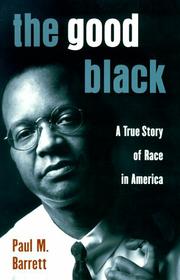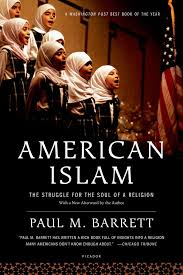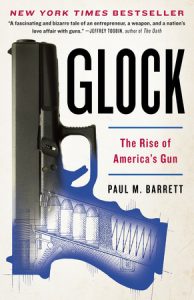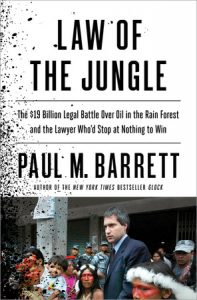Chapter One
SURVEILLANCE
The lawyer Steven Donziger stepped out onto 104th Street. He looked west toward Riverside Park and east toward Broadway. The dark sedans had been tailing him for at least a month now. They followed him for blocks at a time, slowing when he slowed, stopping when he stopped, their passengers watching his every move.
Donziger lived on a quiet block on the Upper West Side of Manhattan. He worked from home, a two-bedroom apartment he shared with his wife, their five-year-old son, and a cocker spaniel. Photographs and artwork from Latin America adorned the apartment. Documents in cardboard boxes surrounded the dining table. In the narrow foyer, stacks of stapled legal filings competed for space with a mud-spattered mountain bike.
On this morning in the spring of 2012, Donziger had wheeled the bicycle down the hall to the elevator and across the marble-floored lobby. Fifty years old, he dressed like a graduate student, in jeans, unironed button-down shirt, and tattered jacket.
“Como estas?” he asked the doorman as they bumped fists.
“Bien, muy bien, senor.”
Then Donziger had emerged from the building and, as was his habit, searched for the dark sedans. Six-foot-four and powerfully built, he would not have been difficult to track. Sometimes, in addition to the cars, he thought he saw men on foot, pretending to peer into store windows if he looked their way.
Donziger began pedaling toward Ocean Grill, a food restaurant where he did business over lunch. As he approached the corner, he glanced over his shoulder in time to see the large car pull out of its parking space and fall in behind him. He didn’t fear actual physical harm. The company was too smart, he thought, to turn him into a martyr. It wanted to distract him, intimidate him.
He despised his corporate foes: their money, their influence, their cynical disrespect for his clients in the Amazonian rain forest of northeastern Ecuador. The company would never willingly pay what it owed. Its lawyers and lobbyists had said as much. Now they were coming after him, making it personal. He’d written down license plate numbers, but the police weren’t interested. Every day people killed each other in New York. What did he expect the police to do about cars that might or might not have been following him?
The surveillance wasn’t his main worry. A year earlier, in February 2011, the company had sued him. The 193-page suit, filed under the federal antiracketeering statute, alleged that he had ginned up fraudulent evidence as part of a conspiracy to extort the company. A federal judge had taken the accusations seriously. The judge forced him to turn over his hard drives, e‑mail, and boxes of documents. Donziger had said some truly dumb things–he admitted that much–and now they were public. His bravado sounded incriminating, he also acknowledged, especially if it was taken out of context. He’d cut a few corners, used tactics they didn’t teach back at Harvard Law School. He could lose his law license. Conceivably, the U.S. Attorney’s Office could bring criminal charges.
The company, as Donziger saw it, fought dirty; he fought back in kind. Slugging it out, he’d pulled off something amazing. His ragtag team had gone to a provincial Ecuadorian courtroom and won a judgment that mighty Texaco had ruined the lives of thousands of farmers and Amazon tribesmen. Because of him, a tiny third-world nation had spoken truth to power. Donziger had pressed the case for nearly twenty years now, beginning as the most junior member of the plaintiffs’ legal team and ultimately rising to field commander. Before going after Texaco (which was acquired in 2001 by Chevron), he’d never brought even a slip-and-fall suit. That he’d survived this long must have shocked the oil company and its lawyers. No wonder they were branding him a racketeer and prying into his personal life.
He was not alone, though. Impressed by the potential for gargantuan legal fees, Patton Boggs, a tough corporate law firm, had joined Donziger. Together, they were seeking liens against refineries, terminals, and tankers worldwide. He’d retained a famous white-collar defense attorney to represent him in the racketeering suit. The Amazon pollution case had been featured on 60 Minutes and in the New York Times, Vanity Fair, The New Yorker, and Bloomberg Businessweek. In 2009, it was the subject of an acclaimed documentary that played at the Sundance Film Festival. A rock star in green-activism circles, Donziger had received support from Bianca Jagger, Sting, and Sting’s wife, the actress Trudie Styler. He had given Brad Pitt and Angelina Jolie a private tour of the oil zone in Ecuador.
“I cannot believe what we have accomplished,” Donziger had written in private notes several years earlier, during a flight to Ecuador. “I cannot wait to get off the plane and see my fellow soldiers–often the only people I feel who get me. I want to look in their eyes and see if they understand the enormity of what this team has accomplished.” He had gone toe-to-toe with one of the most powerful multinationals in the world and won the largest pollution verdict in history: $19 billion. That was billion with a “b,” real money by anyone’s standard. If he could survive the vengeful countersuit and collect the judgment, the Ecuador case would, in Donziger’s expansive estimation, create a precedent benefitting “millions of persons victimized by human rights abuses committed by multinational corporations pursuing economic gain.” And it would make him a very wealthy man.
Arriving at the Ocean Grill, he slowed his bicycle. The surveillance sedan–Wait, were there two of them?–kept cruising south. Donziger chained his bike to a NO PARKING sign and shrugged off his backpack. The spy cars disappeared in traffic. He knew they would circle back. They always did.
Chapter Two
PRESSURE
Six years before he played cat-and-mouse in Manhattan with oil company private eyes, Donziger was headed one cool morning to the Palacio de Justicia in Quito, Ecuador. “We are going down to have a little chat with the judge,” he told the documentary film crew he had invited to follow him. He emphasized the word “chat” in a way that sounded menacing. “This is something you would never do in the United States,” he continued. “But in Ecuador, this is how the game is played. It’s dirty. We have to–occasionally–use pressure tactics to neutralize their corruption, and today is one of those examples.”
Donziger was not an ordinary lawyer. Just out of Harvard Law School, he had worked briefly in a conventional job as a public defender, representing teenagers accused of street crime. But that was a long time ago. The Ecuador oil pollution case had allowed him to grow into what he wanted to be–a human rights advocate, a rabble-rouser, a performance artist with a law degree. Clarence Darrow meets Martin Luther King Jr. meets Abbie Hoffman.
On this day, he aimed to convince an Ecuadorian judge to block Chevron’s attempt to inspect a laboratory Donziger’s team was using to analyze pollution evidence. The company alleged that the lab was incompetent and crooked. Donziger countered that the lab was fine; it was the oil company, he said, that was dishonestly harassing the plaintiffs. As he told the American film crew scrambling to keep up with him, justice in Ecuador often resembled a back-alley brawl.
Donziger and his entourage entered the courthouse and walked down a narrow hallway toward the judge’s office. He had arranged for Ecuadorian television news stations to cover the confrontation. Donziger ushered several cameramen into the judge’s chamber, a cubbyhole space that got so crowded there was no room to turn around. The judge, an elderly bald man, cowered at his desk, blinking behind large eyeglasses. “I sat down in the chair directly in front of the judge,” Donziger later recalled, “where he could smell my breath.”
“I am part of the plaintiffs’ legal team,” Donziger told the judge. The American lawyer wore a charcoal suit with a blue shirt and muted red tie. As a non-Ecuadorian, he did not have the right to speak in court as a lawyer, but technicalities did not deter Donziger. He rose to his feet, drew himself to his full height, and with piercing brown eyes peered down at the judge. “You have to be very careful with the Texaco lawyers,” he began in American-accented Spanish. “They play dirty. They are trying to corrupt a legal process that thirty thousand Ecuadorians are carrying out. They are fighting for their lives.” He repeated: “For their lives.”
The judge was breathing heavily, as if he might have a heart attack.
Donziger cited no Ecuadorian statute or precedent. He invoked only his own ferocious indignation. “They are trying to use you, Your Honor, to do an inspection that is not legal,” he lectured. “Please be careful. Please be very careful.”
The trembling judge announced on the spot that he would suspend the laboratory inspection “in order to study the issue further.” He placed a feeble hand on the sheaf of legal papers on his desk and added: “That’s what I have to offer you.”
At that moment, Diego Larrea, one of the oil company’s lawyers, entered the judge’s office. Larrea had learned belatedly of Donziger’s preemptive strike.
“You’ve suspended the order?” Larrea asked the judge, incredulous. “Your Honor, it must be clear, this is another maneuver.”
Donziger, towering over Larrea, who stood a good six inches shorter, assumed an expression of unrestrained wrath. “This is a corrupt Texaco lawyer!” he bellowed, pointing a long finger at Larrea. In fact, Chevron had subsumed Texaco five years earlier. Chevron paid Larrea’s fees and was the defendant in the litigation. But Texaco had been the oil company active in Ecuador years earlier, and it was Texaco (pronounced locally “Tek-ZAH-ko”) that would resonate with Ecuadorian television viewers.
“Sir,” Larrea said, turning to Donziger and pointing back at him, “you are going to be held responsible for what you say.”
“I take responsibility, sir. You are a corrupt lawyer.” His voice rising theatrically, Donziger repeated the epithet with relish, abogado Tek-ZAH-ko corrupto: “You are a corrupt Texaco lawyer! You are a corrupt lawyer!”
The TV cameras swiveled from combatant to combatant. The judge, unwilling or unable to restore order, reared back from his desk, but there was no place to escape. Finally, a flustered secretary took it upon herself to announce: “This is becoming personal! Step out, please!” The verbal rumble moved to the hallway, TV news and documentary cameras rolling.
Later, Donziger coolly assessed his performance. “Very effective,” he wrote in his notes. “Talk about corruption, talk about how they try to use innocent and good people as vehicles for their own corruption.” He had accomplished his purpose, both in the judge’s office and with Ecuadorian television viewers.
Chapter Three
ARRIVAL
The righteous fury Donziger could summon seemingly at will on behalf of his rain forest clients flowed in equal parts from deeply felt empathy with their plight and his acute thespian instincts. One can genuinely care for the powerless while relishing the role of their protector.
In the personal notes he kept on a laptop comupter, Donziger recalled his first visit to a tribe called the Cofan along the Aguarico River: “When I arrived in the village, I could see the desperation and hope that was being projected onto my presence.” He wondered whether he “could deliver any tangible benefit” to the Indians, “either then or ever.” He hated what he saw as “the desperation in the eyes of the children, and the hollow resignation in the eyes of their parents.”
To honor him, the Cofan children sang traditional story songs for Donziger. Performing without musical accompaniment, the shabbily dressed choir described a time long before their birth when the forest was unspoiled, a common theme of the tribal repertoire. The children performed a dance in Donziger’s honor, dipping their hands in symbolic oil to illustrate what had befallen their culture and the rain forest they lived in and depended on. An elderly woman who sang with the children wore a colorful toucan feather through her nose, the sharpened tip penetrating one nostril, passing through the cartilage, and exiting the other nostril.
Emergildo Criollo, the leader of the Cofan community, initially had mixed feelings about Donziger. He appreciated that the American lawyer had trekked to the remote enclave but found the outsider overwhelming. Donziger spoke too loudly and waved his arms in a manner that made the Indians uneasy. The intricacies of the court proceedings he described eluded the Cofan. But Criollo came to trust him. “He spent time with us,” the tribal leader said. “We saw this gringo lawyer had great passion.”
The chain of events that had brought Donziger to Criollo’s village began more than four decades before the lawyer’s first visit. One day, when Criollo was a boy of six, a helicopter appeared above the treetops. “We were all amazed at the noise it made,” he told me, remembering the remarkable 1964 encounter. “Which type of animal is this that comes flying from so high in the sky?”
Criollo saw the bulbous metal bird disgorge a number of white men in trousers and wide-brimmed hats. At the time, his father was teaching him to use a blow pipe and poison-tipped darts to hunt howler monkeys. The Cofan spoke a local language called A’ingae. A few knew Spanish because of earlier interaction with missionaries and rubber traders, but none of them knew the language spoken by the men from the sky. “We were scared,” Criollo said, “so we hid.”1
The helicopters continued to arrive, delivering other strange machines. “Day and night, they cut the trees. There were explosions and fires. The white men were digging holes.” Criollo and other members of the tribe wondered what they were looking for. He and his father crept to the edge of a clearing the outsiders had carved. “They were eating lunch. They gave us rice. It was the first time we tasted rice, and it was delicious.” The yellow cheese the Indians were given smelled terrible to them, so they threw it into the jungle.
The Cofan lived a relatively isolated existence. They hunted, fished, and grew vegetables, mostly without interference from Hispanic Ecuador. In the late nineteenth century, rubber harvesters and traders had invaded the area and subjected several generations of Indians to brutal debt servitude. The intruders receded and then disappeared during the global depression of the 1930s, giving the Cofan and other tribes several decades of respite before the arrival of the new outsiders seeking oil and sowing fresh disruption. During all this time, the Indians also encountered American Protestant missionaries and Spanish Catholics. The foreign Christians provided machetes, mirrors, and clothing, in addition to Bible lessons. Some Indians went to live at missionary settlements, abandoning villages and straining clan ties.
1 Criollo told me the oilmen were the first Americans he ever encountered. In fact, an American missionary family named Borman had had extensive contact with the Cofan as early as 1955, nine years before Texaco arrived. Given Criollo’s young age at the time of these events, it is not surprising that his chronology is slightly inaccurate.
 Larry Mungin spent his life preparing to succeed in the white world. He looked away from racial inequality and hostility, believing he’d make it if he worked hard and played by the rules. He rose from a Queens housing project to Harvard Law School, and went on to practice law at major corporate firms. But just at the point when he thought he’d make it, when he should have been considered for partnership, he sued his employer for racial discrimination. The firm claimed it went out of its way to help Larry because of his race, while Larry thought he’d been treated unfairly. Was Larry a victim of racial discrimination, or just another victim of the typical dog-eat-dog corporate law culture? A thought-provoking courtroom drama with the fast pace of a commercial novel, The Good Black asks readers to rethink their ideas about race and is a fascinating look at the inner workings of the legal profession.
Larry Mungin spent his life preparing to succeed in the white world. He looked away from racial inequality and hostility, believing he’d make it if he worked hard and played by the rules. He rose from a Queens housing project to Harvard Law School, and went on to practice law at major corporate firms. But just at the point when he thought he’d make it, when he should have been considered for partnership, he sued his employer for racial discrimination. The firm claimed it went out of its way to help Larry because of his race, while Larry thought he’d been treated unfairly. Was Larry a victim of racial discrimination, or just another victim of the typical dog-eat-dog corporate law culture? A thought-provoking courtroom drama with the fast pace of a commercial novel, The Good Black asks readers to rethink their ideas about race and is a fascinating look at the inner workings of the legal profession.
 There are as many as six million Muslims living in the United States, and in American Islam, Paul M. Barrett takes us into their homes, mosques, and private gatherings, from West Virginia to Los Angeles, depicting a population of striking variety. In vivid, subtle, artful prose, Barrett tells seven stories of American Muslims in all their stereotype-defying complexity. Theirs is a dramatic new chapter in the American story, and American Islam is an intimate and vibrant group portrait of American Muslims today.
There are as many as six million Muslims living in the United States, and in American Islam, Paul M. Barrett takes us into their homes, mosques, and private gatherings, from West Virginia to Los Angeles, depicting a population of striking variety. In vivid, subtle, artful prose, Barrett tells seven stories of American Muslims in all their stereotype-defying complexity. Theirs is a dramatic new chapter in the American story, and American Islam is an intimate and vibrant group portrait of American Muslims today. The Glock pistol is America’s Gun. It has been rhapsodized by hip-hop artists and coveted by cops and crooks alike. Created in 1982 by Gaston Glock, the pistol arrived in America at a fortuitous time. Law enforcement agencies had concluded that their agents and officers, armed with standard six-round revolvers, were getting “outgunned” by drug dealers with semi-automatic pistols; they needed a new gun. With its lightweight plastic frame and large-capacity spring-action magazine, the Glock was the gun of the future. You could drop it underwater, toss it from a helicopter, or leave it out in the snow, and it would still fire. It was reliable, accurate, lightweight, and cheaper to produce than Smith and Wesson’s revolver.
The Glock pistol is America’s Gun. It has been rhapsodized by hip-hop artists and coveted by cops and crooks alike. Created in 1982 by Gaston Glock, the pistol arrived in America at a fortuitous time. Law enforcement agencies had concluded that their agents and officers, armed with standard six-round revolvers, were getting “outgunned” by drug dealers with semi-automatic pistols; they needed a new gun. With its lightweight plastic frame and large-capacity spring-action magazine, the Glock was the gun of the future. You could drop it underwater, toss it from a helicopter, or leave it out in the snow, and it would still fire. It was reliable, accurate, lightweight, and cheaper to produce than Smith and Wesson’s revolver. The gripping story of one American lawyer’s obsessive crusade—waged at any cost—against Big Oil on behalf of the poor farmers and indigenous tribes of the Amazon rainforest.
The gripping story of one American lawyer’s obsessive crusade—waged at any cost—against Big Oil on behalf of the poor farmers and indigenous tribes of the Amazon rainforest.